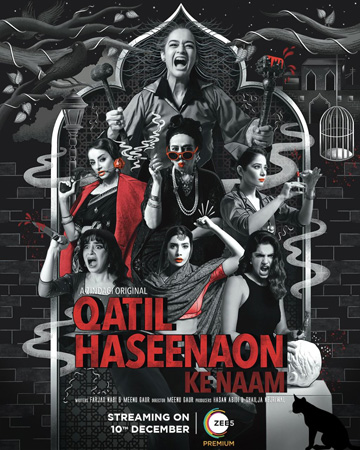‘QHKN’ — Pakistani femme noir series raises a toast to murderous beauties


Set in Pakistan, both series follow women avenging male wrongdoings. Both are directed by expatriate filmmakers. British-Pakistan director Asim Abbasi made Churails. Qatil Haseenaon Ke Naam is directed by British-Indian filmmaker Meenu Gaur, who co-created the series with Pakistani filmmaker and regular collaborator Farjad Nabi. Gaur-Nabi’s 2013 film Zinda Bhaag and Abbasi’s 2018 film Cake were both acclaimed box-office successes and Foreign Language Oscar entries for Pakistan.
Both series share key cast members: Sarwat Gilani, Mehar Bano and Eman Suleman, as well as crew members, including cinematographer Mo Azmi, editor Kamran Shahnawaz, and score composer Saad Hayat. Naturally, there is a strong overlap of themes, production values, aesthetics and performance styles. The key difference is in tone and treatment.
While ‘Churails,’ despite its eye-popping colours and zany energy, struck a balance between being realistic and go-girl comic-book saga, Qatil Haseenaon Ke Naam unfolds in an out-and-out fantasy space.
Churails had a straightforward story of feisty heroines sticking it to the patriarchy, in which the 10 episodes progressed with increasing complexity and dramatic heft. Qatil Haseenaon Ke Naam is a quasi-anthology series with one primary story, but four out of six episodes have similarly themed and loosely connected self-contained stories. If the attempt was to engage with class and gender with some seriousness in Churails, Qatil Haseenaon Ke Naam is entirely concerned with mood.
Blood-soaked Urdu poetry, epic heartache, Gothic imagery, horror, mystery and action movie tropes abound in Qatil Haseenaon Ke Naam. Holding it all together is a superb soundtrack: criss-crossing ghazals, sufi, fusion, hip-hop, electro-pop and rock. This is Qatil Haseenaon Ke Naam’s strongest quality, given that the intent appears to have been to just create fun pulp fiction sans moralising.
Qatil Haseenaon Ke Naam is set in the fictional Androon Sheher, meaning ‘walled city’, which is one way to say that anything that happens here is walled off from reality. Everybody knows everybody here. There appears to be just one dargah, one cop, one mafia don, which are all elements to connect one episode with another.
The main story, or the connecting thread between the six episodes, involves Mai Malki, the leader of a mysterious threesome that hangs out in a dargah, occasionally pops out like supernatural creatures behind an unsuspecting person, and offers commentary on the proceedings in the various episodes like a Greek chorus from jahannam.
Mai Malki happens to be one of the series’ several aggrieved ladies who punish men for their deceit, opportunism and violence. Almost all the men here are bad, unless they are not heterosexual or neck-deep in love. Mai Malki’s story is wrapped up in the final two episodes. Among the preceding four, one episode features a poet-turned-professor-cum-contract killer. Another seems to be an adaptation of Sujoy Ghosh’s Kahaani, but that’s not really a shortcoming. An episode featuring homosexual romance has an ending straight out of Edgar Allan Poe’s head. The best of the lot, titled Massey Ma, stands out for its neat plot.
Despite its baroque affectations that drag the narrative, Qaatil Haseenaon Ke Naam is watchable because of Gaur’s flamboyant direction, intensified by Mo Azmi’s visual palette, and the eclectic music. But it works mostly because of the haseenas. Nearly all the lead performances are to watch out for: Samiya Mumtaz as the dignified but deadly Mai Malki; Mehar Bano as the hooker with a heart of gold, Anarkali; Eman Suleman as the resilient Zehra; Faiza Gillani as the sympathetic nurse Kanwal and Beo Raana Zafar as Massey Ma, whose age belies her sharp instincts and drive for justice.
Recent Posts
- Pakistan
Pakistan army shoots down indian spy drone over LoC
The Pakistan Army shot down an Indian quadcopter that violated its airspace across the Line…
- Pakistan
Explosion at peace committee office kills 9 in South Waziristan
The death toll from the blast near a peace committee office in Wana area of…
- Pakistan
Next two to three days important, says Asif on tensions with India
Defence Minister Khawaja Asif on Monday clarified that he had not predicted the outbreak of…
- Pakistan
CCI ‘buries’ canal project, for now
The Council of Common Interests (CCI) on Monday rejected the federal government's proposal for the…
- Pakistan
PM announces nationwide expansion of digital wallets for payments
Prime Minister Shehbaz Sharif on Monday said that the scope of digital wallets would be…
- Pakistan
CM orders prioritizing public-centric road projects to boost connectivity
Punjab Chief Minister Maryam Nawaz Sharif has directed authorities concerned to prioritize road development projects…
Leave a Comment